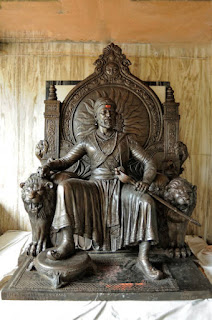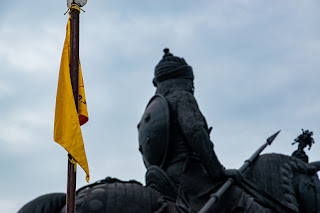Shivaji maharaj
Learnt to admire his mother from childhood, naturally Shivaji developed reverence for women. He only hated the Mughal rule and always disliked or Islam. We can learn a lot from others’ mistakes.” AdvertisementShivaji reminds us that life is a treasure house of experiences. Shivaji stood up to challenges bravely and overcame the odds he faced on the way diligently. Chatrapati Shivaji was a visionary who dreamt of a broad and wide Hindu nation that would also proclaim tolerance and comradeship in a tall manner. They are used by the true Divine Painter for blending the colors and filling in the outlines. The spirit of freedom “Freedom is a boon, which everyone has the right to receive.” AdvertisementShivaji was a lover of freedom. He advocated religious tolerance. At the same time, we must be discriminated against in fulfilling promises. Indian history’s one of the bravest and enlightened rulers, Chatrapati Shivaji is a legend for all times. If it is a temple, the bells are rung in yearning for Him alone.” AdvertisementShivaji cherished the highest wisdom of the oneness of religions. Once a stone thrown by an old woman at a tree to fetch a mango accidentally hit Shivaji and he forgave her and rewarded her with the wealth that would support her to the rest of her life. He was the truest advocate of will-power and bravery that became the very symbols of this great warrior. Through this route, our lifetime will not suffice to reach our goals. Shivaji stresses on the importance of learning from history and getting inspired by the lives and achievements of our forefathers. One needs to cultivate will power and courage that can lead him forward to achieve in life. He had a belief that god blesses only those that are confident and hardworking. At the same time, we must be courageous enough to assert our capabilities and confide in them. In this quote he stresses on the importance of acquiring education and knowledge that can ably support everyone’s vision and mission. The feats he could show to the world in terms of warfare, administration and nation building were phenomenal which few could replicate. He respected mosques on par with temples. For the spirited people, no task is impossible “When you are enthusiastic, the mountain also looks like a clay pile.” AdvertisementShivaji not only spoke great vales; he also lived by it. The importance of education and knowledge “Each person should get an education, because, during a war, the thing which not be achieved by strength, that can be achieved by knowledge and tricks and the knowledge comes from education.” AdvertisementA greater part of Shivaji’s achievements were due to his smart and clever moves than the power of weapons or the size of his army. Courage is in the heart of people and not in weapons “Even if there were a sword in the hands of everyone, it is a willpower that establishes a government.” AdvertisementMere weapons cannot achieve things in life. Importance of history and the knowledge of our forefathers “We must know the history of that place in which we live and the history of our ancestors.” AdvertisementThe stories from epics and the history of this nation narrated by his mother Jijibai to the young Shivaji helped a great deal in shaping him. If it is a mosque, the call to prayer is chanted in remembrance of Him. Tolerance and duties of a ruler “If a tree, which is not a highly elevated living entity, can be so tolerant and merciful to give sweet mangoes even when hit by anyone; being a king, should I not be more merciful and tolerant than the tree?” AdvertisementHere Shivaji stresses on the importance of a ruler demonstrating tolerance and responsibility towards his subjects. He punished those who erred against women and protected and honored the women captives during war though they belonged to an enemy nation. God blesses the self-motivated “When you start loving your goals by all your heart and mind, then from the grace of Goddess Bhawani, you will surely get the victory.” AdvertisementWhile stressing on the importance of devotion, Shivaji equally stressed on the need to self-motivate oneself. His stupendous achievements carved him a unique place in the annals of this nation. Life is short and we must be open to learn from other people’s experiences “No need to be learned from my own fault. Thieves and oppressors are never worthy of wasting our promises on them. The glory of Motherhood “Of all the rights of women, the greatest is to be a mother.” AdvertisementShivaji was molded and nurtured by his mother Jijibai who inspired him with stories from epics. Shivaji was a self-made warrior and administrator. Mastering Guerilla warfare, often Shivaji defeated large and mighty armies with a few hundreds of soldiers. We must be prepared to learn from others’ mistakes so that we do not commit them in our own lives. His Maratha army had a lot of Muslim soldiers. Here are a few quotes of Shivaji Maharaj which can inspire anyone with the ideals he stood for in his life. He shaped himself to achieve big things in life. With smaller armies, he created terror in the minds of enemies. We all have a responsibility towards our fellowmen which we must fulfill in a discriminate manner “You should promise to each person who needs your help, in order to achieve your goal. We cannot wait to commit mistakes in our own life and learn from them. See Also - How you can check PM Kisan scheme beneficiaries list Top 10 richest people in the world. Confidence and courage are important for men “Never bend your head always hold it high.” AdvertisementShivaji’s name brings to our minds his dauntless spirit that could never be shaken during adversities and troubles. All religions are the roads to the same God “Verily, Islam and Hinduism are terms of contrast. His life was a mission in which he sought to give freedom to anyone and everyone through his warfare and administration. He fulfilled his responsibilities towards others to the best of his abilities be it to his family or to the society. But fulfill only those promises that you have given to saints and holy people, not those given to thieves.” AdvertisementShivaji was a good son, an able administrator, a reliable friend, a worthy enemy and a knowledgeable motivator. A coin has both sides and so does the personality of a true warrior “Do not think of the enemy as weak, then do not be too scared to feel too strong.” AdvertisementIn this quote, Shivaji reminds us that we must not be overconfident and negligent in assessing the opposition without due care. He enjoyed freedom in spirit and practice. He could never tolerate suppression and oppression.

















